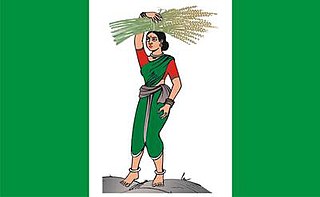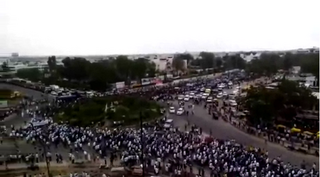Related Research Articles

Janata Dal was an Indian political party which was formed through the merger of Janata Party factions, the Lok Dal, Indian National Congress (Jagjivan), and the Jan Morcha united on 11 October 1988 on the birth anniversary of Jayaprakash Narayan under the leadership of V. P. Singh.

The Janata Party was a political party that was founded as an amalgam of Indian political parties opposed to the Emergency that was imposed between 1975 to 1977 by Prime Minister Indira Gandhi of the Indian National Congress. In the 1977 general election, the party defeated the Congress and Janata leader Morarji Desai became the first non-Congress prime minister in independent modern India's history.
Patel is an Indian surname, predominantly found in the state of Gujarat representing the community of land-owning farmers and later businessmen, agriculturalists and merchants. Traditionally the surname is a status name referring to the village chieftains during medieval times, and was later retained as successive generations stemmed out into communities of landowners, including Patidars, Kolis, Kurmis, some Parsis and Muslims. There are roughly 500,000 Patels outside India, including about 150,000 in the United Kingdom and about 150,000 in the United States. Nearly 1 in 10 people of Indian origin in the US is a Patel.

The Janata Dal (Secular) is an Indian political party led by former prime minister of India, H. D. Deve Gowda. The party is recognized as a State Party in the states of Karnataka, Kerala and Arunachal Pradesh. It was formed in July 1999 by the split of Janata Dal party. It has a political presence mainly in Karnataka. In Kerala, the party is a part of the Left Democratic Front (LDF).

Keshubhai Patel was an Indian politician who was the Chief Minister of Gujarat in 1995 and from 1998 to 2001. He was a six-time member of Gujarat Legislative Assembly. He was a member of RSS since 1940s, of Bharatiya Jana Sangh in 1960s, Janata Party in 1970s, and the Bharatiya Janata Party (BJP) from 1980. He subsequently left the BJP in 2012 and formed the Gujarat Parivartan Party. He was elected from Visavadar in the 2012 state assembly election but later resigned in 2014 due to ill health and merged his party with BJP. He was awarded India's third highest civilian award the Padma Bhushan posthumously in 2021.

Patidar is an Indian landlord and agrarian caste found mostly in Gujarat but also in at least 22 other states of India. The community comprises at least three subcastes—the Anjanas, Kadavas and Levas They form one of the dominant castes in Gujarat. The process leading to its recognition is a paradigmatic example of the invention of tradition by social groups in India. The Patidars originated from Gujarati Kunbis who reinvented their identity during the British Raj.
Somabhai Gandalal Koli Patel is an Indian politician and a member of the 15th Lok Sabha of India. He represents the Surendranagar constituency of Gujarat and is a member of the Indian National Congress. Patel was arrested during the Emergency in 1977–78.
The history of Gujarat began with Stone Age settlements followed by Chalcolithic and Bronze Age settlements like Indus Valley Civilisation. Gujarat's coastal cities, chiefly Bharuch, served as ports and trading centers in the Nanda, Maurya, Satavahana and Gupta empires as well as Western Kshatrapas period. After the fall of the Gupta empire in the 6th century, Gujarat flourished as an independent Hindu/Buddhist state. The Maitraka dynasty, descended from a Gupta general, ruled from the 6th to the 8th centuries from their capital at Vallabhi, although they were ruled briefly by Harsha during the 7th century. The Arab rulers of Sindh sacked Vallabhi in 770, bringing the Maitraka dynasty to an end. The Gurjara-Pratihara Empire ruled Gujarat after from the 8th to 10th centuries. As well as, for some periods the region came under the control of Rashtrakuta Empire and Pala Empire. In 775 the first Parsi (Zoroastrian) refugees arrived in Gujarat from Greater Iran.

Navnirman Andolan was a socio-political movement in 1974 in Gujarat by students and middle-class people against economic crisis and corruption in public life. It is the only successful agitation in the history of post-independence India that resulted in dissolution of an elected government of the state.

Chimanbhai Patel was an Indian politician associated with Indian National Congress and Janata Dal, and a former Chief Minister of Gujarat state in India representing both those parties at various times. Patel is known as the founder of Kokam Theory which was initiated to counter the Kham Theory of Indian National Congress and it was very successful in Saurashtra and South Gujarat to achieve the hug support from Kolis which was 24% of the state population.
Babubhai Jashbhai Patel was the chief minister of Gujarat state in India. He held the office twice, first time from June 1975 to March 1976 as the leader of Janata Morcha and the second time from April 1977 to February 1980 as leader of Janata Party.
On 1 May 1960, the Indian State of Gujarat was created out of the 17 northern districts of former State of Bombay. These districts were later further subdivided. There are 33 administrative districts in the state. Unlike other cities, Gandhinagar has its own administrative body, 'The Capital Project division', created by the Government of Gujarat in 1965 for Balanced & Deciplinate System in Gandhinagar capital city.
Chhabildas Mehta was an Indian politician and the former Chief Minister of Gujarat who served from 1994 to 1995.
Siddharth Chimanbhai Patel is an Indian politician from Gujarat. He was a MLA of Indian National Congress from Dabhoi from 1998 to 2002 and from 2007 to 2012. He is a son of former Chief Minister of Gujarat, Chimanbhai Patel. He is ex-president of GPCC.

Narhari Amin is a politician from Gujarat state of India. He is a member of the Indian Parliament (MP) affiliated with the Bharatiya Janta Party. Formerly he was a Deputy Chief Minister of Gujarat affiliated to the Indian National Congress in 1994. He left the Indian National Congress on 5 December 2012 after he was denied a ticket to contest the December 2012 state legislative assembly election. On 6 December 2012, he joined the Bharatiya Janata Party.
Liladhar Vaghela was a Member of Parliament or Lok Sabha from Patan constituency in Gujarat, India.
KHAM stands for Koli Kshatriya, Harijan, Adivasi and Muslim. Here Kshatriya is taken to include the Kolis. in the Kham combine, Kolis were the largest caste represented at different lavels of politics and Madhavsinh Solanki increased the reservation quota for Other Backward Class in Gujarat. The theory was propounded by Madhavsinh Solanki in 1980s in Gujarat to create vote bank for Indian National Congress and prepared by Jhinabhai Darji. Using the formula, Congress was able to capture 149 seats in the 182-member Assembly. However the formula alienated Patels permanently from Congress. during the Kham alliance, castes such as Bania, Patidar and Brahmins lost their importance in state so they propounded the Anti reservation agitation in 1981 and 1985 in Gujarat to get ride of the power of OBC castes.
Alpesh Thakor is a politician from Gujarat, India. He was a member of Gujarat Legislative Assembly representing Radhanpur (2017–2019). Formerly associated with the Indian National Congress party, he joined Bharatiya Janata Party in 2019. He started his career as a social worker and political activist. He is a leader of the Koli Thakor community in Gujarat. He founded the Gujarat Koli Thakor Sena as well as OBC, SC, ST Ekta Manch, a social platform to demand reservations for people of the respective communities, around which a movement took place in Gujarat shortly after the Patidar reservation agitation.
The 8th Gujarat Legislative Assembly election was held in 1990. No party won the majority. Janata Dal (JD) and Bharatiya Janata Party (BJP) won 70 and 67 seats respectively. Indian National Congress won only 33 seats, compared to 149 seats in previous legislative election. The alliance of BJP and JD formed the government under the chief ministership of Chimanbhai Patel of JD and deputy chief ministership of Keshubhai Patel of BJP.
An Overview of the Political parties in Gujarat.
References
- ↑ The political topography of Gujarat Archived September 27, 2007, at the Wayback Machine
- ↑ India on the Threshold of the 21st Century: Problems of National Consolidation. India: "Social Science Today" Editorial Board, Nauka Publishers. 1990. p. 174. ISBN 978-5-02-023554-0.CS1 maint: date and year (link)
- ↑ Sheth, Pravin N. (1998). Political Development in Gujarat. New Delhi, India: Karnavati Publications. p. 27.CS1 maint: date and year (link)